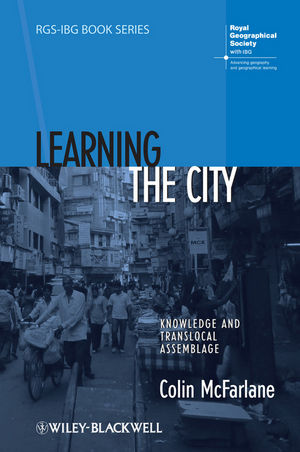Learning the City: Knowledge and Translocal AssemblageISBN: 978-1-4051-9281-1
Paperback
240 pages
August 2011, Wiley-Blackwell
 This is a Print-on-Demand title. It will be printed specifically to fill your order. Please allow an additional 10-15 days delivery time. The book is not returnable.
|
||||||
“Readers who have ever puzzled over the movement of particular discourses or knowledge systems from one urban context to another, or between otherwise disparate groups, will find in this volume an exhaustive and compelling effort to theorize the development, movement, and effects of learning … Its revelatory power is arguably profound: for McFarlane, it promises nothing short of understanding the power to forge a different kind of city. In the 21st century city, the material and analytical stakes of learning could not be higher.” (Antipode, 1 September 2013)
“This book is a significant step in bringing learning to the core of urban study … This volume’s detailed fieldwork effectively supports its desire to see learning occupy a central place in the production of more socially just urbanisms.” (Area, 1 May 2013)
“Learning the City is a critical academic contribution useful for scholars of the field ... It is sure to become indispensable for academics of the discipline.” (Geography Helvitica, 1 December 2012)
"Through Learning the City McFarlane has made a major contribution to our understandings of the urban. In its commitment to the diverse and lively practices through which the city is learned and known, in its engagement with the diverse forms of agency and political practices through which agency is assembled and re-assembled the book enlivens understandings of spatial politics. It is also a text that is animated by a powerful sense of hope that cities might come to bere-assembled in different ways that are more equitable and more open to different agentic forces and contributions." (Society and Space, 1 November 2012)"In Learning the City, McFarlane successfully manages to open the black box of urban learning in widening the perspective to acknowledge diverse urban learning practices, which may even bear a transformative potential in certain contexts." (International Planning Studies, 23 October 2012)
"Learning the City is an important and theoretically
sophisticated piece of work. It is like a good movie: you need to
re-view it in your mind several times to position yourself ...
McFarlane’s innovative theory of urban learning is very
helpful to an understanding of contemporary urbanism and of how it
can be changed for the better. Its great merit is to make us see
cities as complex learning assemblages and milieus." (Urban
Geography, 34.1)
“A wonderfully insightful book that rewards careful attention and deserves a wide readership ... A powerful framework for re-thinking issues of poverty, urban informality and development in the Global South.” (Singapore Journal of Tropical Geography 34 (2013))
“A rich and perceptive account of how we dwell in and
learn about cities and what it takes to live an urban life …
McFarlane’s book forces us to review the conceptual tools we
have in the planning field for “getting to know” what
cities are like and how urban life is experienced.” (Patsy
Healey, Planning Theory & Practice, 14:2)
“Urbanism, McFarlane believes, needs a theory of learning; throughout his book he builds a very sophisticated one…[he] brings us closer to the material stuff of urban life and politics…a kind of urbanism in motion, whereby what we come to term ‘knowledge’, ‘infrastructure’ and ‘resources’ are never simply ‘there’, but must be translated, distributed, coordinated, perceived and inhabited”. (International Journal of Urban and Regional Research, Volume 38.1, January 2014).
"Innovative in its approach and rigorous in its coverage, this book is an important contribution to the field of urban studies and human geography. It challenges the standard format of the research monograph and introduces new vectors of knowledge and debate to the study of cities. In a world where the usual North-South dichotomies are being disturbed, McFarlane's emphasis on a postcolonial approach to practices of learning is a valuable framework."—Ananya Roy, University of California
"McFarlane's work stands out in that it tells us how residents
from various walks of life actually learn to operate in
heterogeneous and often volatile urban environments. Instead
of assuming that urban dwellers walk around with preconceived maps
in their heads, this book provides a comprehensive account of the
various practices, mobilizations and tools they use over time so
that the city becomes a staging area for new capacities and
potentials."
—AbdouMaliq Simone, Goldsmith College, University of
London



